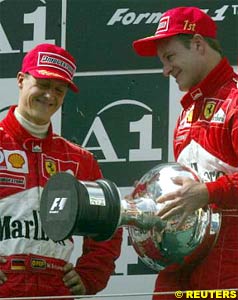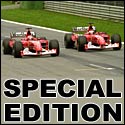
Atlas F1 GP Correspondent
Ferrari's decision to impose team orders at the Austrian Grand Prix last Sunday angered Formula One fans the world over, and gave room to reactions never seen before in a Grand Prix. But was their star driver Michael Schumacher at fault or was it the team? And why do they now stand a chance to receive heavy penalties from the FIA? Jane Nottage sheds some light on the affair
The normally calm and cool Schumacher looked visibly shaken as he sat down for an Inquisition he hadn't quite expected on a sunny afternoon in the midst of the Austrian mountains. He admitted he regretted the decision, then why, as someone pointed out, hadn't he simply disobeyed it? He is, after all, the favoured son at Ferrari, and it is unthinkable that he would be sacked for disobeying an order many felt should not be made. He mumbled something about not having time to think, which just got him into deeper water, as this is the guy who can make shopping lists while carving his way through the traffic at over 180 mph.
So it all got very emotional and any rational decisions were lost in a sea of accusations, and the threat of an FIA investigation and a summon to appear before the World Council on 26th June. But what is the truth? What is really going on behind the closed doors of Ferrari in the little town of Maranello deep in the countryside of Northern Italy?
It might surprise people to know that Ferrari are going about their business as normal. Ferrari Chairman Luca di Montezemolo, has given his full support to team principal Jean Todt declaring, "Thirty seconds from the end of the race I was hoping Barrichello would win, but two seconds after Todt's decision I agreed with him. Rubens won the race but ten points have gone to Michael."
Ferrari's master strategist technical director Ross Brawn was even more forthright saying, "Until the World Championship is decided either in our favour or not, then the same situation (to stop Barrichello in favour of Schumacher) will be repeated. We could repeat it at Monaco next week."
So, a very bullish Ferrari while the rest of the world asks if this is a truly sporting action, but there are several aspects of this situation to consider.
Formula One is a sport where the fastest driver wins (usually but not always), and the points accrue to the end of the Championship where there are two World Championships, one for the Constructors and one for the Drivers. A lot of money and prestige rides on these titles. With the entry of more car manufacturers into the sport, the end result of a Sunday race is that the car manufacturer will hope that the race enthusiast will walk into his showroom on a Monday morning and purchase a new car. This is worth millions, if not billions, to the victor.
True enough is that Ferrari's position in the Constructor's Championship would not be changed by either Barrichello or Schumacher winning Sunday's race, Ferrari were on a maximum sixteen points anyway. But what was at stake was the Driver's Championship. Ferrari are a one man team, they clearly define Michael Schumacher as their number one driver and at the start of the race he was on 44 points while Rubens was way behind on six points.
There is little chance that Rubinho will win the Driver's World Championship in 2002 but every chance that current World Champion Michael Schumacher will win it for a record equalling fifth time at the end of 2002. But even with a massive margin of over twenty points over his nearest rival BMW-Williams driver Juan Pablo Montoya, things can change from one race to the next. For three years in a row in 1997, 1998 and 1999 Ferrari lost the World Championship to rivals Williams and McLaren at the last race, a series of blows they have recovered from but never forgotten, therefore the stockpiling of points is vital.
Those are the rational reasons for Ferrari's decision on Sunday but what of the emotions that course through this wonderfully passionate, still quintessentially Italian team? It is certain that this wasn't an easy decision. Afterwards, Barrichello was philosophical, as well he might be, having just re-signed for another two years for $12 million dollars, but Michael Schumacher was unhappy, embarrassed, and ill at ease.
This is a man who is ruthless on the track but vulnerable off it. He seems impenetrable but he is in fact emotional and proud. Having written a book about Ferrari in 1996 and 1997, and knowing him quite a bit, I can tell you that he will have gone home to his house near Geneva, back to his wife Corinna - his emotional rock and best friend - and his two children Gina Maria and Mick, with a nasty taste in his mouth, wondering if his own image was damaged by the sight of his teammate being made to give way to him just before the chequered flag. His great drives will flash before his mind and he will go over and over the race asking himself whether he could have pushed harder or whether he should simply have refused to overtake Barrichello.
It is easy to criticise Schumacher but hard to see justice. He is, after all, an employee - a well paid one on £25 million dollars a year admittedly, but still an employee, and he has a very close, almost telepathic relationship with his boss, Jean Todt. They trust each other implicitly, and he would never let Jean Todt down. Disobeying him would have meant doing just that. So it is useless to blame Schumacher - he is simply the best driver of a generation and nothing that happened on Sunday will change that.
Rather the question must be was Ferrari's behaviour correct? In terms of team orders it can be argued that it is their team and they can do what they like, but what isn't in their power to do is change the rules. That is in the power of the FIA, the governing body of world motorsport, and the antics on the podium were one step too far.
It is the FIA Formula One World Championship, not the Ferrari World Championship, and it was not within their power to decide that Barrichello should stand on the winner's rostrum rather than Schumacher, and it was certainly not within their power to allow Schumacher to hand the winning trophy to Barrichello. From within the corridors of the FIA, there are mutterings that heavy sanctions will be applied to Ferrari by the FIA on 26th June for that scene. It is one thing to run your own team; it's quite another to try and run the winning ceremony.
But at the end of the day Ferrari's mistake was not handing victory to the favoured son - after all, one more sublime performance from the master driver will cancel the shame of Sunday. No, it was to be too rational when emotion was required to allow Barrichello the victory he deserved, and too emotional when rational behaviour was required on the podium, when protocol should have been adhered to whatever the circumstances. By that time it was too late to change the order of victory, the only thing to do was accept your decision with good grace and stick to the clearly defined rules and regulations that encompass the victor on the podium in front of the global television audience.
As for the rest, Ferrari's supremacy is never in doubt. The combination of best car and driver will see them lift both World Championship trophies at the end of the year. The years of work by Ferrari team boss Jean Todt, technical director Ross Brawn, engine director Paolo Martinelli, chief designer Rory Byrne and their respective teams will not be swept aside by Sunday's result. However, maybe that short theatrical display of self indulgence on the podium will return to haunt the World Champions when they stand before the World Council on 26th June.
Sunday 12th May will be remembered as the day when Formula One faced the Inquisition from a public and international media outraged by the blatant manoeuvrings of the World Champions Ferrari in favour of their number one driver Michael Schumacher. Just a few metres from the chequered flag, the race leader and number two Ferrari driver Rubens Barrichello was asked by the team to move over in favour of Ferrari's number one driver, current World Champion, and World Championship leader Michael Schumacher. He complied and the rest, as they say, is history.
 The crowd booed the decision and more shockingly the international press room which houses the Formula One media during each Grand Prix, broke into boos, whistles and jeers when the podium winners walked into the press room for the traditional apres race press conference.
The crowd booed the decision and more shockingly the international press room which houses the Formula One media during each Grand Prix, broke into boos, whistles and jeers when the podium winners walked into the press room for the traditional apres race press conference.
Please Contact Us for permission to republish this or any other material from Atlas F1.
